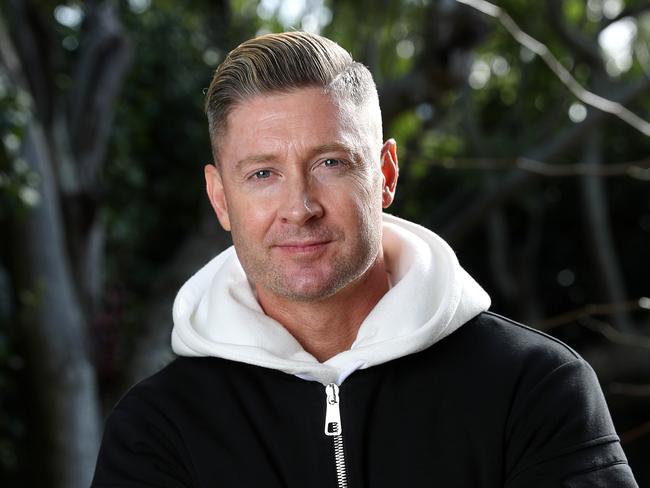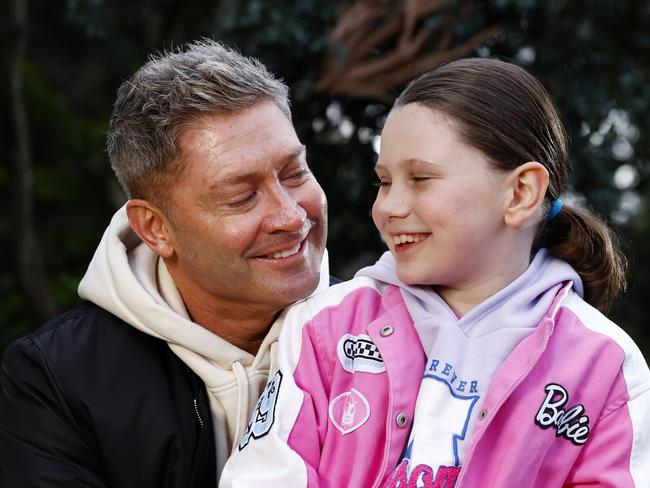OCD explained: What is Obsessive Compulsive Disorder
Australian cricketer Michael Clarke has revealed he believes he has lived with OCD his whole life. See what the disorder is and how you can treat it.

Health
Don't miss out on the headlines from Health. Followed categories will be added to My News.
Former Australian cricketer Michael Clarke has revealed, despite no formal diagnosis, that he believes he has lived with obsessive compulsive disorder (OCD) his whole life.
In the latest episode of the podcast Mental As Anyone, Clarke discussed the behaviours he exhibits which he believes indicate he has OCD.
“I have never been checked, I think it is a given,” he said.
“It is like ADD, it’s a given. Definitely, ask my parents, you don’t need to take me to a doctor.”

Clarke’s house is always immaculately clean. His car is always full of petrol. He is rarely if ever late.
The devoted father to eight-year-old daughter Kelsey-Lee puts his clothes out before bed so he is prepared for the morning.

So what is OCD and can you treat it? Here’s what to look out for:
WHAT IS OCD?
Obsessive compulsive disorder (OCD) is an anxiety disorder that affects more than half-a-million Australians, according to government website Health Direct.
From time to time most people will have irrational thoughts or impulses but for people with OCD they tend to “hold on these thoughts and behaviours more tightly and are unable to control or limit them”.
OCD can sometimes also occur alongside other mental health issues including anxiety, depressive, impulse-control or substance use disorders, reports mental health organisation Sane
WHAT ARE THE SYMPTOMS OF OCD?
OCD can present in different ways for different people but there are two main symptoms: obsessions and compulsions.
People living with the consider can experience either symptom, or both, according to Sane.
These symptoms can lead people to feelings of shame and embarrassment, and it can be exhausting and interfere with their daily life.
OBSESSIONS
Obsessions are being unwanted thoughts, images or urges that repeatedly come to mind and cause distress.
Obsessions can include: fear of contamination from germs, dirt or toxins; fear of harm to themselves or others; intrusive secual or violent thoughts; concerns about symmetry, order and routine; or concerns about spirituality or religious issues, according to Sane.
COMPULSIONS
Compulsions are repetitive actions or behaviours, and can occur for a variety of reasons including a response to an obsession or to reduce stress.
Some common compulsions include: Excessive hand washing or cleaning; repeated counting or ordering of objects; excessive checking of locks or safety items; touching, tapping or moving in a certain way; mentally repeating words or numbers a certain numbers of times.

WHAT CAUSES OCD?
“There is no single cause of OCD. It is likely to be a combination of neurological, genetic, cognitive and behavioural factors. Some people with OCD have experienced traumatic events, and stressful situations can trigger its onset,” according to Sane’s website.
HOW COMMON IS OCD?
In Australia, about 3 per cent of adults live with OCD, according to a study published in the Lancet in 2009.
According to Health Direct, it affects more than 500,000 people.
It usually starts in late childhood or early teenage years.
HOW IS OCD DIAGNOSED?
The first step to OCD diagnosis is to visit your doctor but there is no single test for the condition, according to Health Direct.
The doctor can make a diagnosis based on a person’s behaviours, thoughts, feeling and level of distress and impact on their life.
A referral may be given for the person to visit a psychologist, psychiatrist or occupational therapist.

HOW TO PREVENT, TREAT OCD?
Treatment can help manage and reduce the symptoms of OCD.
It starts with first talking to a GP, who can provide referrals and more information about what options are available.
Treatment can mean working with a mental health professional, such as a psychologist or counsellor, but can also include medications such as antidepressants.
A combination of treatments may be recommended.
One such treatment is Cognitive Behaviour Therapy (CBT), which can help people living with OCD find new and more positive ways to copy with their symptoms, according to Health Direct.
Exposure and Response Prevention is a type of CBT that can help people identify what makes them anxious and helps them to confront them to help manage and reduce symptoms.
IS OCD COMMON AMONG ATHLETES?
OCD may be more common in athletes, experts suggests.
According to a report published in The American Journal of Psychiatry in 2017, OCD may affect 5.2 per cent of college athletes.
“Despite self-reported symptoms lasting more than half a decade, no athletes who screened positive for OCD had been diagnosed, and few received psychological treatment”, the authors said.
The Australian Institute of Sport’s 2022 Mental Health Audit found more than half of 305 athletes who participated in the survey reported symptoms of common mental health problems, with more than a quarter experiencing anxiety or depression. It’s unclear if OCD was part of the scope of this audit.
HOW DOES OCD DIFFER FROM ADHD?
While attention deficit hyperactivity disorder (ADHD) and OCD share some symptoms, they are different conditions with different causes and different approaches to treatments.
ADHD is a neurodevelopmental conditions that can result in issues with attention, hyperactivity and impulsivity. It is a common condition that affects children and adults and can lead to challenges in education, work and social settings.
It is possible for a person to have both ADHD and OCD
SUPPORT
Kids Helpline - 1800 55 1800
Lifeline - 13 11 14
Sane - Sane.org
International OCD Foundation - iocdf.org
More Coverage
Originally published as OCD explained: What is Obsessive Compulsive Disorder





